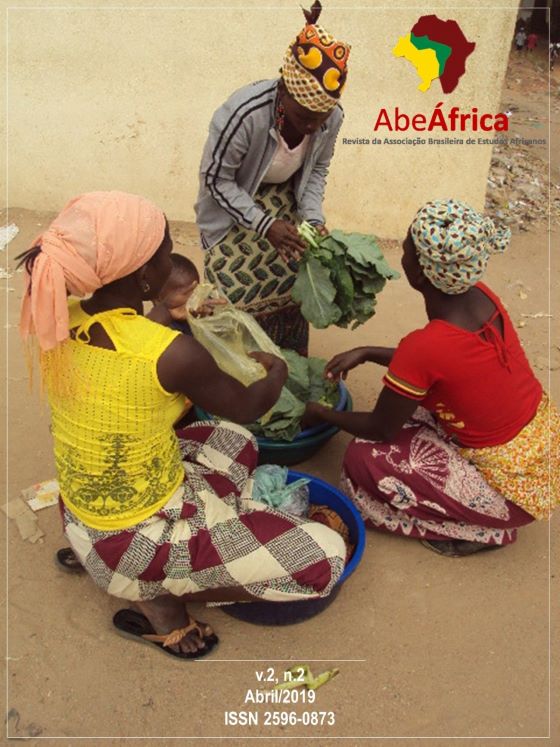Ativismo crítico pós-colonial: Raça, Genocídio e Reparação
Resumo
Busca-se a relacionar a luta por reparação das comunidades descendentes da política colonial de extermínio racial alemã a perspectiva de justiça pós-colonial de Mbembe. As comunidades Hereros e Namas reivindicam a restituição de restos humanos de seus ancestrais provenientes do contexto de violência colonial e racial. Ao fazer isso, contestam a destituição de um tempo e de um saber próprio, que relegou ao corpo africano a condição de vítima da opressão racial, objeto de interesse científico e atributo de uma epistemologia eurocêntrica.
Downloads
Referências
MEMORY, Biwa. 'Weaving the Past with Threads of Memory': Narratives and Commemorations of the colonial war in southern Namibia. ´phd Thesis. University of the Western Cape, November 2012.
CASTRO, Josué. A política ovaherero: poder e conflito na Namíbia central. Tese de Doutorado, Universidade de Brasília. 2013.
DEUTSCHER, Museumsbund. Recommendations for the Care of Human Remains in Museums and Collections, April 2013.
DRECHSLER, Horst. Let us die fighting : the struggle of the Herero and Nama against German imperialism (1884-1915) Horst Publisher Zed Press (London) 1980.
ERICHSEN, C.W. “The angel of death has descended violently among them”. African Studies Centre, Leiden, 2005.
FÖRSTER, Larissa.““These skulls are not enough”: The Repatriation of Namibian Human Remains from Berlin to Windhoek in www.darkmatter101.org/2011.
FANON, Frantz. Os condenados da Terra. Civilização Brasileira 1978.
Fuhr &Seewald. Schrumpfköpfe und andere menschliche Überreste WELT, 30.3.2015.
von Luschan F. VölkerRassenSprachen . Welt ,Berlin, 1922.
GROSSE, Pascal. Eugenik, Kolonialismus und bürgerliche Gesellschaft in Deutschland, 1850-1918. Frankfurt: Campus, 2000.
GEWALD, Jan-Bart. Herero Heroes: A Socio-Political History of the Herero. Oxford.1999.
HENRICHSEN, Dag Herrschaft und Alltag im vorkolonialen Zentralnamibia: Das Herero- und Damaraland im 19. Jahrhundert, Basel, Basler Afrika Bibliographien, Windhoek, Namibia Wissenschaftliche Gesellschaft, 2011.
KRÜGER, Gesine and Dag Henrichsen, '"We have been captives long enough. We want to be free": Land, uniforms and politics in the history of the Herero in the interwar period', in Patricia Hayes, Jeremy Silvester, Marion Wallace, Wolfram Hartmann (eds.), Namibia under South African Rule: Mobility and Containment, 1915-46, Out of Africa, Windhoek, 1995.
KOSSLER, R. Genocide, Apology and Reparation: the linkage between images of the past in Namibia and Germany. European Conference on African Studies, 2007.
MBEMBE, Achile. On the postcolony. Berkeley: University of California 2001.
MBEMBE, Achile. As formas africanas de auto-inscrição. Estudos Afro-Asiáticos. Ano 23, nº 1, 2001.
MBEMBE, Achile. A crítica da Razão Negra. Lisboa . Antigona ed, 2014.
OLUSOGA, David & ERICHSEN, Casper W. The Kaiser's Holocaust: Germany's Forgotten Genocide and the Colonial Roots of Nazism. London: Faber and Faber. Pelz, Daniel. 2010.
RASSOOL, c. ‘Human Remains, the Disciplines of the Dead and the South African
Memorial Complex’, in D. Peterson, K. Gavua and C. Rassool (eds), The Politics of
Heritage in Africa, Economies, Histories, and Infrastructures (Cambridge,Cambridge University Press, 2015, pp. 133–56, p. 155.
STOECKER, Holger, Thomas Schnalke, and Andreas Winkelmann, eds. 2013. Sammeln, Erforschen, Zurückgeben? Menschliche Gebeine aus der Kolonialzeit in akademischen und musealen Sammlungen. Berlin: Links. 2013.
ZIMMERER, Jürgen and Zeller, Joachim. Genocide in German South-West Africa: The colonial war of 1904-1908 and its aftermath Pontypool: Merlin Press. 2013.
ZIMMERMAN, Andrew. “German Anthropology and the ‘Natural Peoples’: The Global Context of Colonial Discourse.” In German Colonialism: Another Sonderweg? Special issue of European Studies Journal 16 (1999): 95–112.
ZIMMERMAN, Andrew, Anthropology and anti -humanism in Imperial Germany. Chicago University press. 2006.
Artigo recebido para publicação em: julho de 2019.
Aprovado para publicação em: setembro de 2019.
Downloads
Publicado
Edição
Seção
Licença
São automaticamente cedidos à Revista os direitos autorais sobre originais e traduções nela publicados. Os dados e conceitos abordados são da exclusiva responsabilidade do autor.

